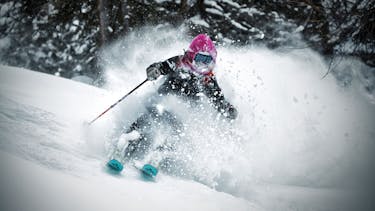
American freeride athlete Lynsey Dyer has dedicated a large portion of her career to empowering women and girls. From helping to create the nonprofit SheJumps in 2007—an organization with the goal to foster participation and confidence in women and girls in the outdoors—to being a dedicated mentor for women of all ages, she has worked tirelessly to make the mountains a more inclusive space. And now as a Fischer athlete, she is proud to carry the torch of the Skis for Skiers campaign based on Fischer Skis’ decision to do away with their women’s specific ski constructions.
“Gender can be such a triggering topic that gets people fired up,” Dyer muses, alluding to why it’s been so hard in the past to get the ski industry to sign on to the idea that women don’t need separate skis from men. “I like to go to the data. That’s why I’m proud of Fischer for looking at data. Their move to eliminate women’s skis originated from ski racing at the highest level. They were finding that the highest performing females were skiing on men’s skis—educated skiers, women who are skiing for a living. It’s just a fact that the highest performing skis were performing for both genders. The skis don’t discriminate—they just perform. So as long as you have the power to ski them, you get the benefit.”
Dyer’s sentiments are born from experience. Before becoming an athlete for Fischer Skis, she, like many other female athletes, had to navigate common hurdles in dealing with companies who water down their women’s gear.

“At one point in my career, I skied for a brand where the only women’s skis on the freeride side were flimsy park skis, and I wasn’t able to get the men’s skis,” Dyer notes of her past struggles with finding appropriate gear to allow her to progress as she wanted. “I stayed focused and trained harder to be able to stomp big cliffs perfectly centered. I wasn’t going to let inappropriate gear get in the way. As a hungry athlete with a specific goal, you’re going to find a way.”
And she’s very clear about what her progression would have looked like if those brands from her past had understood the importance of acknowledging that there are many types of female skiers, from the bunny hill to the Hahnenkamm.
“One hundred percent I would have gone much farther on the right gear or even equal gear as my male counterparts,” she states about her own lack of access to the appropriate gear. “I try not to dwell on things out of my hands. I would often hear from that same cohort that women only ski for the lunches and the fashion show, and that they didn’t need hard-charging gear. That mentality kept me focused and I’m so glad to be here as the tide has changed.”

To Dyer, that change looks like high-level male and female athletes donning the same gear on the slopes and in Instagram feeds. “When you show up as a coach for the day and the male pro is on the same skis that the female pro is on, I think that’s huge for these kids to see,” she explains about the growing impact of non-gendered gear in the ski industry, especially when she is mentoring future generations of skiers, both boys and girls. And of the bright colors of the Ranger 102, she explains, “The other great part about what Fischer is doing is that you’ll see the colorful skis they’re making and, as women, we grew up loving it when people mistook us for guys. But it’s going both ways now because guys are skiing on the same skis the women are skiing on. Guys on the skis and women on the skis are doing the same stuff, and that’s really neat.”
Dyer believes that this change in perspective on women’s skis is here to stay and that Fischer is at the forefront of a new era of increased access to better gear for women in skiing. “When it comes to performance on the hill, we’re finally being loud enough that the ski industry is hearing us and it’s great to see,” She muses, and continues, “Because it’s a small industry and because industries are beginning to recognize what a major part women play in skiing, we’re going to see this shift more and more and it’s a great time to be a woman in our industry. I can almost guarantee that we’re going to see this trend proliferate and I’m happy to be a part of what Fischer is doing to lead the way.”



